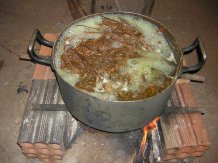
Ayahuasca, a psychedelic brew often used in the Amazon region
Traditional Amazonian drug linked to improved sense of wellbeing
A psychedelic drug traditionally used in South America improves people’s general sense of wellbeing and may offer a treatment for alcoholism and depression, new research suggests.
Ayahuasca, a psychedelic brew often used in the Amazon region, contains dimethyltryptamine (DMT) – an illegal class A drug in the UK.
Previous research has suggested that psychedelic drugs such as LSD and magic mushrooms can help alcoholics tackle their addiction.
A psychedelic drug traditionally used in South America improves people’s general sense of wellbeing and may offer a treatment for alcoholism and depression, new research suggests.
Ayahuasca, a psychedelic brew often used in the Amazon region, contains dimethyltryptamine (DMT) – an illegal class A drug in the UK.
Previous research has suggested that psychedelic drugs such as LSD and magic mushrooms can help alcoholics tackle their addiction.
Using Global Drug Survey data from more than 96,000 people worldwide, researchers from the University of Exeter and University College London found that ayahuasca users reported lower problematic alcohol use than people who took LSD or magic mushrooms.
Ayahuasca users also reported higher general wellbeing over the previous 12 months than other respondents in the survey.
“These findings lend some support to the notion that ayahuasca could be an important and powerful tool in treating depression and alcohol use disorders,” said lead author Dr Will Lawn, of University College London.
“Recent research has demonstrated ayahuasca’s potential as a psychiatric medicine, and our current study provides further evidence that it may be a safe and promising treatment.
“It is important to note that these data are purely observational and do not demonstrate causality.
“Moreover, ayahuasca users in this survey still had an average drinking level which would be considered hazardous. Therefore, randomised controlled trials must be carried out to fully examine ayahuasca’s ability to help treat mood and addiction disorders.
“However, this study is notable because it is, to the best of our knowledge, the largest survey of ayahuasca users completed to date.”
Ayahuasca – a blend of the Psychotria Viridis bush and the stems of the Banisteriopsis Caapi vine – is used by indigenous tribes and religious groups in the Amazon region, as well as many visitors.
The online survey, which was promoted via social media, measured wellbeing using the Personal Wellbeing Index – a tool used by researchers around the world which asks about things such as personal relationships, connection with the community and a sense of achievement.
Of the respondents, 527 were ayahuasca users, 18,138 used LSD or magic mushrooms and 78,236 did not take psychedelic drugs.
Senior author Professor Celia Morgan, of the University of Exeter, said: “If ayahuasca is to represent an important treatment, it is critical that its short and long-term effects are investigated, and safety established.
“Several observational studies have examined the long-term effects of regular ayahuasca use in the religious context.
“In this work, long-term ayahuasca use has not been found to impact on cognitive ability, produce addiction or worsen mental health problems.
“In fact, some of these observational studies suggest that ayahuasca use is associated with less problematic alcohol and drug use, and better mental health and cognitive functioning.”
However, the survey data showed a higher incidence of lifetime mental illness diagnoses within the ayahuasca users. Subsequent analyses found that these were confined to users from countries without a tradition of ayahuasca use.
The researchers said future studies should examine the relationships between ayahuasca use, mental health, wellbeing and problematic alcohol and substance use among these people.
The survey also asked people about the experiences of ayahuasca, and most users said they took the drug with a healer or a shaman.
Ayahuasca was rated as less pleasant and with less of an urge to use more of it than LSD or magic mushrooms. Its acute effects usually lasted for six hours, and were most strongly felt one hour after consumption.
The paper, published in the Nature journal Scientific Reports, is entitled: “Well-being, problematic alcohol consumption and acute subjective drug effects in past-year ayahuasca users: a large, international, self-selecting online survey.”
Date: 9 November 2017
